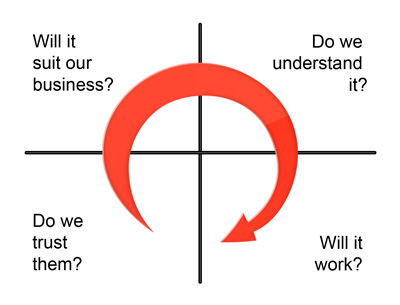The Inductive Deductive Schism
The Inductive Deductive Schism
The rain continued to fall as the car swung onto the bridge. The dark was of a soft, velvety kind, softened the more so by the occasional halo of a street light or a warm kitchen window.
My week at the client had been eventful, in a low-key way, but puzzling. And not for the first time had I been puzzled by such events. The comforting gabble of a BBC Radio 4 documentary continued to keep me company:
“..,.and the Protestants have an entirely different approach to making decisions…”
I paid a little more attention to the voice on the radio:
…we finally realised that the negotiators from the Protestant and Catholic communities approached decision-making from opposite ends of a spectrum…
That sounded strangely familiar. The radio documentary was discussing the travails of the mediators in trying to bring the two communities of Norther Ireland together, and agree ways forward acceptable to both.
…one set of negotiators approach an issue from a deductive logic position, whereas the other side approach the self-same issue from a position of inductive logic. Whilst the one want to start out with general principles, the other always want to start from specifics. We made no headway until we realised this…
Upon hearing this, and the subsequent further elaboration of the documentary, I began to recall an article I had read only a few weeks previously in a trade journal. I continued to ponder the idea, and its connection to my puzzle, until I reached home, several hours later.
Once home, I found the article and read it again. It explained that business folks and technical folks – such as IT people – approach making decisions using the same four questions, but in exactly the reverse order, the one from the other:
The Business Person’s Logic
Business folks generally start out by asking themselves first and foremost “do we trust them?” (the supplier, the advisor, the salesman, etc.), and proceed clockwise around the diagram (above), until arriving at – for them – the least important question: “will it work?”.
The Technologist’s Logic
Technical folk more often start out by asking themselves first and foremost “will it work?” (the tool, the product, the solution), and proceed anti-clockwise around the diagram (above), until arriving at – for them – the least important question: “do we trust them?”.
In itself, this mismatch of priorities explains, for me, hundreds of occasions where I have seen technical and business folks discussing a seemingly simple issue, and yet completely failing to arrive at a consensus.
Putting the radio documentary together with the article, and at the time being interested in identifying “patterns” and, specifically, a pattern language for project management, I created a pattern for this case and named it “The Inductive / Deductive Schism”.
Maybe you’ve had the same kind of puzzling experience? Might you find this idea useful in your practise?
– Bob
Further Reading
Deductive Reasoning Versus Inductive Reasoning ~ Sociology article at About.com
Notes on the Synthesis of Form ~ Christopher Alexander
How Buildings Learn ~ Stewart Brand




Pingback: Five Blogs – 14 July 2012 « 5blogs
Do you have a url or citation for the original trade journal article?
Hi Sean,
Sorry but no. I spent some time during the preparation of this post looking for it, to no avail. If you (or anyone else) finds it I would be much obliged for a link or copy.
– Bob
Now that’s one hell of an insight.
A very useful insight indeed. You will find a lot more along these lines in the 2001 book “Mastering the Infinite Game: How East Asian Values are Transforming Business Practices” by Charles Hampden-Turner and Fons Trompenaars (best known for “Riding the Waves of Culture”).